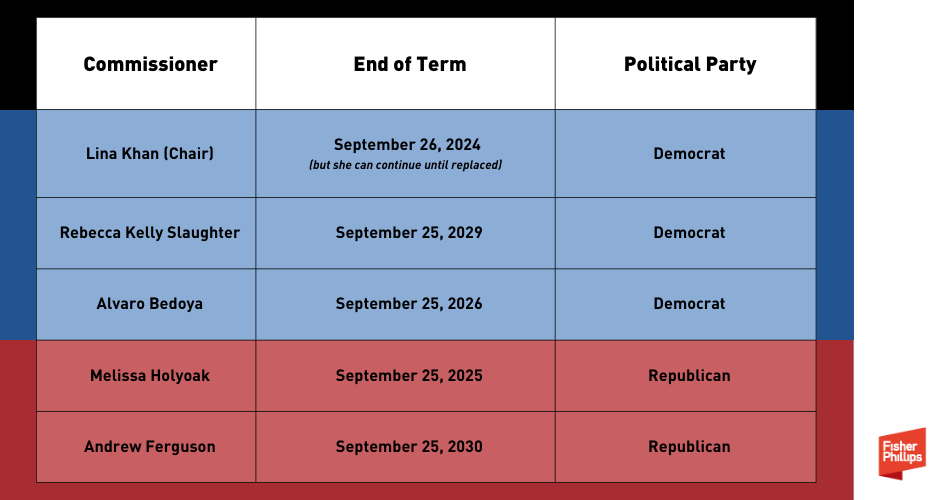Trump Announces Andrew Ferguson to Serve as New FTC Chair: FAQs for Employers
Insights
12.13.24
President-elect Donald Trump just announced that he plans to appoint current Commissioner Andrew Ferguson as the new Chair of the Federal Trade Commission (FTC) and will appoint Mark Meador to fill current Chair Lina Khan’s vacancy. What can employers expect next after the December 10 announcement? And what do these changes mean for the direction of the FTC? The following FAQs will review some background information about the FTC and its makeup before providing employers a roadmap about what to expect in the coming years.
What is the FTC?
The FTC is an agency of the federal government tasked with the enforcement of civil antitrust law and the promotion of consumer protection via rulemaking and enforcement actions. Most employers didn’t know much about the agency until it took significant steps in the last several years to focus on alleged unfair competition in the labor market, not just the consumer market. Some examples include:
- the FTC’s first-ever enforcement action against an employer over their use of non-compete agreements with employees;
- the FTC’s policy statement regarding the agency’s enhanced enforcement focus on gig economy companies; and
- most significantly, the April 2024 rule that attempted to ban non-compete agreements nationwide (the “Non-Compete Ban”).
How is the FTC Structured?
The FTC is run by five Commissioners, each of whom serves seven-year terms. One of the Commissioners is appointed by the President to serve as the agency’s Chair, and no more than three of the Commissioners can be affiliated with the same political party. While the FTC Chair directs agenda-setting and oversees day-to-day operations of the agency, decisions regarding substantive matters, such as enforcement actions and policy initiatives, require a majority vote of the Commissioners.
Currently, the FTC’s Commissioners include:
How and When Will Commissioner Ferguson Become FTC Chair?
Once President-elect Trump takes office, he is expected to formally name Commissioner Ferguson to Chair the FTC, which does not require Senate approval.
He is also nominating Mark Meador, an antitrust lawyer and former Congressional staffer with prior FTC and DOJ experience, to fill the vacancy that will be left by Chair Khan. With Republicans holding a Senate majority, it is likely that Mr. Meador’s appointment will be confirmed.
Confirmation will probably happen quickly. But there’s also another option: a recess appointment. The incoming republican Senate Majority Leader, John Thune, recently insinuated that he supported this option, tweeting that the Senate would act “quickly and decisively” to get nominees confirmed and indicated that “all options are on the table to make that happen, including recess appointments.”
What Does the New FTC Mean for Employers?
Assuming that Mr. Meador is confirmed by the Senate, the Republicans will have a three-Commissioner majority in the FTC. The FTC’s policy goals and enforcement priorities will quickly shift from Biden- and Democrat-supported initiatives to Trump- and Republican-supported initiatives.
The Non-Compete Ban is one of the primary FTC initiatives under the Biden administration that is likely to reach a final dead-end under a Republican-controlled FTC. It was challenged in Texas, Florida, and Pennsylvania (the Pennsylvania case was voluntarily dismissed after the court sided with the FTC). In the Florida case, the court issued a preliminary injunction precluding its enforcement, but only as applied to the plaintiff. In the Texas case, the court set aside the rule with nationwide effect. The FTC has appealed the Texas decision to the 5th Circuit and the Florida decision to the 11th Circuit.
With a change in leadership, we expect that the FTC will abandon both appeals. When the Non-Compete Ban was first passed, Commissioners Ferguson and Holyoak issued strong dissenting statements opposing it, arguing that it was unconstitutional, outside the FTC’s authority, and against sound public policy. Just last week, Commissioner Ferguson said in a dissenting statement on the FTC’s enforcement action over a “no-hire” agreement that the Non-Compete Ban “wildly exceeded” the FTC’s authority.
If the FTC abandons its appeals, then the Non-Compete Ban will be effectively dead.
So Does This Mean Government Scrutiny of Non-Compete Agreements is Over?
In a word – no.
Somewhat surprisingly, Commissioner Ferguson said in his dissenting statement last week that the FTC “is wise to focus its resources on protecting competition in labor markets. After all, the antitrust laws protect employees from unlawful restraints of the labor market as much as they protect any output market.” He went on to say he has “no doubt that some noncompete agreements violate the Sherman Act.”
This means that employers should not expect the FTC to turn a blind eye to agreements that overreach. Even if the Non-Compete Ban goes away for good, the FTC maintains it has the authority to go after employers over their non-compete agreements in individual enforcement actions. Commissioner Ferguson’s statements seem to indicate that enforcement actions over non-competes are still very much on the table for a Republican-controlled FTC.
And setting aside any federal oversight, many states have laws regulating non-compete agreements and other restrictive covenants (e.g., customer non-solicitation agreements, employee non-solicitation agreements, and certain confidentiality agreements). Regardless of whether any such laws apply to your business, there is always a requirement that restrictive covenants be narrowly tailored to reasonably protect an employer’s legitimate, protectible interests. Noncompliance with this tricky subject area can have disastrous effects – mandatory civil penalties, payment of employees’ attorneys’ fees and costs, and invalidation of contracts aimed at protecting your confidential information, trade secrets, goodwill, and other important interests.
Employers must get restrictive covenant agreements “right” at the outset. You need to continuously monitor state and local changes that could affect the enforceability of your already executed and future restrictive covenants, especially if you operate in multiple states. You can check out Blue Pencil Box for our daily updates on restrictive covenant law. This comprehensive resource not only provides detailed daily summaries of cases and laws involving non-competes and other restrictive covenants, but also maintains a comprehensive database and customizable checklists to help you comply.
Conclusion
If you have any questions about this topic, or if you would like to discuss how to best ensure that your company is complying with all restrictive covenant requirements, consult with your Fisher Phillips attorney, the authors of this Insight, or any member of our Employee Defection and Trade Secrets team. Make sure you are subscribed to Fisher Phillips’ Insight System to gather the most up-to-date information directly to your inbox.
Related People
-
- Jonathan Crook
- Partner
-
- Francis Wilson
- Associate


